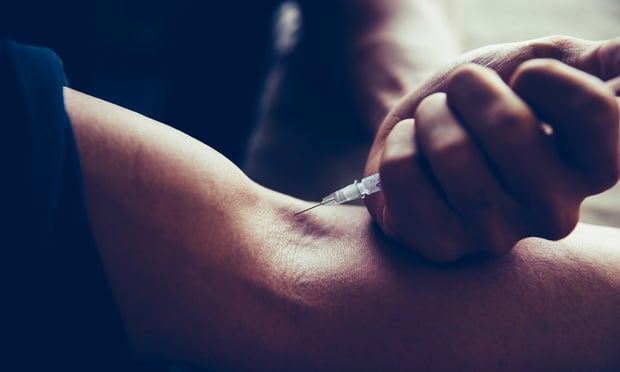Judge Halts Opening of Safe Injection Site, Citing COVID-19 Pandemic and Protests
U.S. District Judge Gerald McHugh found the challenges of dealing with community unrest following the death of George Floyd and the coronavirus pandemic makes the opening of nonprofit safe injenction site Safehouse "unrealistic any time soon."
June 25, 2020 at 02:47 PM
5 minute read
 Photo: HappyTime19/Shutterstock.com
Photo: HappyTime19/Shutterstock.com
A federal judge has hit pause on efforts to open the nation's first so-called safe injection site, where heroin users would be able to inject the drug under medical supervision, citing Philadelphia's "frayed" nerves in the midst of a global pandemic and mounting protests for social justice reform.
U.S. District Judge Gerald McHugh of the Eastern District of Pennsylvania on Tuesday granted the government's request to temporarily block the site from opening until the U.S. Court of Appeals for the Third Circuit can review the issue.
McHugh's decision comes four months after he initially gave the nonprofit Safehouse the green light to open the site, finding that its "consumption room," where medical staff would oversee heroin injections, would not violate the law.
Since it's the first to delve into issues about the legality of overdose prevention sites, the case is set to deal with a raft of novel questions and is widely seen as one that will provide guidance to other federal districts as they begin to grapple with similar issues.
In seeking the stay, the U.S. Attorney's Office for the Eastern District of Pennsylvania had raised numerous public policy concerns, including arguing that allowing the site to open would go against the will of Congress and would lead to a spike in crime and heroin usage, but McHugh rejected all of those arguments, and instead said the site needed to be paused because the city was already in the midst of fighting the highly contagious COVID-19, while at the same time trying to address widespread protests over need for social justice reforms.
"All change results in some level of disruption, and Philadelphia has already experienced two profound disruptions. It is confronted with a public health crisis even larger than the opioid epidemic, which has strained municipal government and individual citizens to an unprecedented degree, imposing extreme demands on the city's resources and employees," McHugh said. "At the same time revenues have dwindled because of the deep downturn in economic activity. The nerves of citizens are frayed by fear and uncertainty, and that was true before the death of Mr. Floyd and the widespread protests that arose in its aftermath."
After the ruling allowed Safehouse to open in February, the nonprofit quickly suffered a major setback, as its initial plans to almost immediately open the site led to strong backlash from the local community, which had not previously been involved in the plans. Soon after, the initial plans were scrapped.
DLA Piper attorney Ilana Eisenstein, who represented Safehouse, said in a statement that the organization believes overdose prevention is still needed in the city, but that it would respect the ruling.
"Although the court's opinion today grants a stay pending appeal, it does not back away from its conclusion that Safehouse's overdose prevention services are legal," she said. "The court reinforces the public health arguments that Safehouse has been making for two years, and the court agrees that the public health data supports the benefits of supervised injection sites, shows favorable outcomes for individuals suffering from addiction, and may produce positive benefits for the community."
A spokeswoman for U.S. Attorney William McSwain's office declined to comment about the ruling.
McHugh's ruling in February focused on a narrow interpretation of whether the site would violate a portion of the Controlled Substances Act colloquially known as the "crack house" statute, but his opinion Tuesday dealt more directly with the broader public policy concerns that the parties have raised.
Specifically, McHugh said the government's arguments about harm to the community and increasing drug use relied "exclusively on inference rather than facts," while Safehouse cited peer review studies to support its arguments. He further said his ruling hadn't decriminalized any activity, as prosecutors could still arrest the drug users. Although McSwain had said that his office might make that move if the site were allowed to open before an appeals court ruling, McHugh noted that McSwain's office had not brought any drug possession cases between 2018 and 2019.
"The government's position is therefore difficult to rationalize, except as a symbolic act," he said.
While McHugh admitted there was a reasonable chance the appeals court would disagree with his understanding of the Controlled Substances Act, he said allowing the site to open would also further complicate issues the city is already facing in light of protests and the pandemic.
"To be sure, the threat imposed by COVID-19 does not diminish the threat posed by opioid addiction," he said. "But, by any measure, the challenges of coping with the pandemic and with recent community unrest understandably triggered by the death of George Floyd present strains on the city—government and citizens alike—that make the proposed opening of Safehouse unrealistic any time soon."
This content has been archived. It is available through our partners, LexisNexis® and Bloomberg Law.
To view this content, please continue to their sites.
Not a Lexis Subscriber?
Subscribe Now
Not a Bloomberg Law Subscriber?
Subscribe Now
NOT FOR REPRINT
© 2025 ALM Global, LLC, All Rights Reserved. Request academic re-use from www.copyright.com. All other uses, submit a request to [email protected]. For more information visit Asset & Logo Licensing.
You Might Like
View All

Am Law 100 Lateral Partner Hiring Rose in 2024: Report


Law Firms Mentioned
Trending Stories
- 1Uber Files RICO Suit Against Plaintiff-Side Firms Alleging Fraudulent Injury Claims
- 2The Law Firm Disrupted: Scrutinizing the Elephant More Than the Mouse
- 3Inherent Diminished Value Damages Unavailable to 3rd-Party Claimants, Court Says
- 4Pa. Defense Firm Sued by Client Over Ex-Eagles Player's $43.5M Med Mal Win
- 5Losses Mount at Morris Manning, but Departing Ex-Chair Stays Bullish About His Old Firm's Future
Who Got The Work
J. Brugh Lower of Gibbons has entered an appearance for industrial equipment supplier Devco Corporation in a pending trademark infringement lawsuit. The suit, accusing the defendant of selling knock-off Graco products, was filed Dec. 18 in New Jersey District Court by Rivkin Radler on behalf of Graco Inc. and Graco Minnesota. The case, assigned to U.S. District Judge Zahid N. Quraishi, is 3:24-cv-11294, Graco Inc. et al v. Devco Corporation.
Who Got The Work
Rebecca Maller-Stein and Kent A. Yalowitz of Arnold & Porter Kaye Scholer have entered their appearances for Hanaco Venture Capital and its executives, Lior Prosor and David Frankel, in a pending securities lawsuit. The action, filed on Dec. 24 in New York Southern District Court by Zell, Aron & Co. on behalf of Goldeneye Advisors, accuses the defendants of negligently and fraudulently managing the plaintiff's $1 million investment. The case, assigned to U.S. District Judge Vernon S. Broderick, is 1:24-cv-09918, Goldeneye Advisors, LLC v. Hanaco Venture Capital, Ltd. et al.
Who Got The Work
Attorneys from A&O Shearman has stepped in as defense counsel for Toronto-Dominion Bank and other defendants in a pending securities class action. The suit, filed Dec. 11 in New York Southern District Court by Bleichmar Fonti & Auld, accuses the defendants of concealing the bank's 'pervasive' deficiencies in regards to its compliance with the Bank Secrecy Act and the quality of its anti-money laundering controls. The case, assigned to U.S. District Judge Arun Subramanian, is 1:24-cv-09445, Gonzalez v. The Toronto-Dominion Bank et al.
Who Got The Work
Crown Castle International, a Pennsylvania company providing shared communications infrastructure, has turned to Luke D. Wolf of Gordon Rees Scully Mansukhani to fend off a pending breach-of-contract lawsuit. The court action, filed Nov. 25 in Michigan Eastern District Court by Hooper Hathaway PC on behalf of The Town Residences LLC, accuses Crown Castle of failing to transfer approximately $30,000 in utility payments from T-Mobile in breach of a roof-top lease and assignment agreement. The case, assigned to U.S. District Judge Susan K. Declercq, is 2:24-cv-13131, The Town Residences LLC v. T-Mobile US, Inc. et al.
Who Got The Work
Wilfred P. Coronato and Daniel M. Schwartz of McCarter & English have stepped in as defense counsel to Electrolux Home Products Inc. in a pending product liability lawsuit. The court action, filed Nov. 26 in New York Eastern District Court by Poulos Lopiccolo PC and Nagel Rice LLP on behalf of David Stern, alleges that the defendant's refrigerators’ drawers and shelving repeatedly break and fall apart within months after purchase. The case, assigned to U.S. District Judge Joan M. Azrack, is 2:24-cv-08204, Stern v. Electrolux Home Products, Inc.
Featured Firms
Law Offices of Gary Martin Hays & Associates, P.C.
(470) 294-1674
Law Offices of Mark E. Salomone
(857) 444-6468
Smith & Hassler
(713) 739-1250





